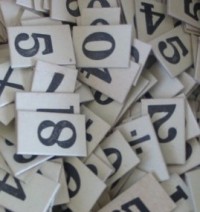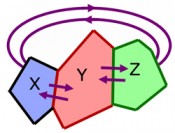Bunuimhreacha, Orduimhreacha is Maoluimhreacha — A Thiarcais! (Oh my!) Posted by róislín on Dec 25, 2012 in Irish Language
(le Róislín)
Yes, yet another méimtheideal (meme title), with my old favorite “3 + Oh my!” as the “méim.” For this blog, we’ll look at three types of numbers in Irish: bunuimhreacha [BUN-IV-rukh-uh], orduimhreacha [ORD-IV-rukh-uh], and maoluimhreacha [MWEEL-IV-rukh-uh / MWAYL-IV-rukh-uh]. And we’ll polish it off with some tagairtí Nollag from, you guessed it, “Dhá Lá Dhéag na Nollag” (an t-amhrán carnach), since we’re speaking of, nay, we’re “leata ar na huimhreacha” sa bhlag seo. The Christmas gifts from the song are referred to here in a short form (i.e. without all the “a-drumming” bits), so that they’ll fit in the chart; the full terms and a lot more background information (colly vs. calling, etc.) can be found in the mionsraith of blogs on transparent.com, starting with: Dhá Lá Dhéag na Nollag (The Twelve Days of Christmas). The full webliography is given below.
At any rate, before we dive ceann ar aghaidh into na huimhreacha iad féin, let’s first look briefly at what those three categories of numbers mean:
a) bunuimhreacha, cardinal numbers, lit. “basic”-numbers. These are your basic number forms like “one, two, three,” etc., used when actually counting things, but not usually used for counting people. Examples of bunuimhreacha would be “dhá chat” and “trí mhadra” (two cats and three dogs). Counting people is done differently and is treated in some other previous Transparent blogs (see more references in the webliography thíos).
b) orduimhreacha, ordinal numbers, i.e. numbers like “first, second, third, fourth,” etc., used for ranking things in order. Examples include “an chéad uair” and “an tríú fear” (the first time, the third man)
c) maoluimhreacha, independent (lit. “bald”) (!) numbers, used “independently,” i.e. when not actually counting. Examples include giving phone numbers; saying numbers for lottery tickets, buses, routes, and flights; saying arithmetic problems out loud; counting “down,” and saying the mysterious string of numbers in ABC’s Lost (a ceathair, a hocht, a cúig déag, a sé déag, srl.). These numbers are preceded by the particle “a.”
While there is a reasonable amount of leanúntas (continuity) as you go from number to number and purpose to purpose (bun-, ord-, and maol-), there are also slight differences, as you’ll see in the table immediately below.
| Uimhir (mar fhigiúr) | Bunuimhir | Maoluimhir | Foirm ord-uimhriúil | Orduimhir | Lá den Nollaig | Bronntanas An Lae Sin** | ||||
|
Do “náid” (0), féach ar an miontábla thíos) |
|
|||||||||
| 1 | amháin | a haon | 1d (1ú) | chéad* | an chéad lá … | patraisc | ||||
| 2 | dhá | a dó | 2ú (2a) | dóú (dara, tarna, srl.) | an dara lá … (… dóú …) | féaráin bhreaca | ||||
| 3 | trí | a trí | 3ú | tríú | an tríú lá … | cearca francacha | ||||
| 4 | ceithre | a ceathair | 4ú | ceathrú | an ceathrú lá … | lonta dubha | ||||
| 5 | cúig | a cúig | 5ú | cúigiú | an cúigiú lá … | fáinní óir | ||||
| 6 | sé | a sé | 6ú | séú | an séú lá … | géanna | ||||
| 7 | seacht | a seacht | 7ú | seachtú | an seachtú lá … | ealaí | ||||
| 8 | ocht | a hocht | 8ú | ochtú | an t-ochtú lá … | cailíní bleánaí | ||||
| 9 | naoi | a naoi | 9ú | naoú | an naoú lá … | mná uaisle | ||||
| 10 | deich | a deich | 10ú | deichiú | an deichiú lá … | tiarnaí | ||||
| 11 | aon…d(h)éag | a haon déag | 11ú | aonú…déag | an t-aonú lá déag … | píobairí | ||||
| 12 | dhá…d(h)éag | a dó dhéag | 12ú | dara…déag (dóú … déag) | an dara lá déag … | drumadóirí | ||||
* NB: “chéad” will switch to “aonú” for 11th, etc. (i.e. also for 21st, 31st, etc.), but we won’t deal with those here since our theme song lasts for the 12 days of Christmas, not 21 or 31!)
** de réir an amhráin “Dhá Lá Dhéag na Nollag”
Now you might be wondering what’s the story with zero? I’ve decided to put it in a separate line, simply because it works a little bit differently as a number, especially when you get to the ordinals. “Zeroth” (or “zeroeth”) isn’t a word I use very much in English, ní nach ionadh, and I’m sure I use “nialasach” even less. Maybe some of you fisiceoirí or innealtóirí out there might have some occasion to talk about the “dlí nialasach” (zeroth law), but, quite frankly, I don’t. Don’t know much about “teirmidinimic,” chun parafrása a chur ar amhrán Sam Cooke.
| Uimhir | Bunuimhir | Maoluimhir | Foirm ord-uimhriúil | Orduimhir | Lá den Nollaig | Bronntanas An Lae Sin |
| 0 | Not really used for counting but various words for ‘zero’ / ‘nothing’ exist (náid, neamhní nialas, etc.) | a náid | 0ú (rarely used IMThF) | nialasach, or, on a limited basis, náidiú | Errmm, is there a 0th day of Christmas? | If the day is 0, is the gift a “neamhbhronntanas, or perhaps a “leagan frithdhamhna” of the original series of gifts? |
So how do we use these “zero” words? Most useful, probably, is “a náid,” which might occur in situations like uimhreacha fóin, cóid phoist, or ticéidí crannchuir. To say that there are “zero boxes” left, I wouldn’t actually use any of the words for “zero” given above, but instead I’d say “Níl boscaí ar bith fágtha” (there aren’t boxes at all left) or to be a little folksier about it, “Diabhal bosca atá fágtha” (Divil a box is left). The higher realms of counting “nothing” are probably best left to the matamataiceoirí, fealsúnaithe, and teoiriceoirí in bhur measc, níl siad “i mo bhailltíocht” féin.
While “nialasach” corresponds to “zero” as an adjective in phrases like “cluiche nialasach” (zero-sum game) or “buiséadú ar bhonn nialasach (zero-based budgeting), it doesn’t occur frequently for “zeroth” or “0th.” The main example of “zeroth” I have found is “Dlí Nialasach na Teirmidinimice,” which precedes “Céad-Dlí na Teirmidinimice,” “Dara Dlí na Teirmidinimice,” and “Tríú Dlí na Teirmidinimice.” But then, neither “zeroth” nor “0th” are very frequent in English either!
Of the tiny handful of “0ú” references I found online (using the “-ú” abbreviation), most appeared in strings of *cibearghabaildígiúc (to coin a phrase). When I sorted for 0ú + Gaeilge, I got 116 hits, most of which were equally meaningless except for a few repeated references to “0ú haois” in a string that included 1ú haois, 2ú haois etc., referring to the 0th century, 1st century, 2nd century, etc. I don’t think I had ever heard any references to a “0th century” until I went looking for it, but may be the coincheap does have its role in the study of time. One of the hits for “0ú” appears to be a typo for “10ú,” “20ú,” or “30ú,” since it indicated that a certain meeting was held “ceithre huaire i rith 2007 (four times in 2007), including on “0ú Meán Fómhair” (the 0th of September). Not necessarily a typo, you say? Hmm, well, glitch éigin sa leanúntas spás-ama, is dócha.
And now that we have the basic numbers from 0 to 12 and a set of Christmas references, how about some of those far-fetched items from the song “Dhá Lá Dhéag na Nollag“? Can you fill in the blanks for the following? Freagraí thíos.
a) dhá _______________ fhrancacha
b) cúig __________________ óir (or, if you go with the ring-necked bird interpretation, you could do: cúig ___________________ mhuinceacha)
c) sé ____________ ag breith
d) seacht ___________ ag snámh
Gluais: bailltíocht, bailiwick; cibear-, cyber-; crannchur, lottery; frithdhamhna, antimatter; leata ar, reveling in; and, for the lighter moments, *cibearghabaildígiúc (“gabaildígiúc” is my adaptation of Maury Maverick’s deliberately and humorously “grotesque” 1944 coinage, “gobbledygook,” first used in a memo banning “gobbledygook language.” That task would, of course, be as hopeless as the attempt of G. Vernon Bennett, a school superintendent, to enforce an anti-slang week in 1915 (among the offending words in Bennett’s day were: “cut it out,” “hand him a lemon,” and “give him the once-over”).
Bhuel, sin é don bhlag seo. Tá súil agam gur bhain tú sult as agus gur chleachtaigh tú an t-amhrán. SGF, Róislín
Nóta Maidir le Dlíthe na Teirmidinimice: If anyone out there would like to explain, in Irish, why the laws of thermodynamics go from “zeroth” to “third” instead of from “first” to “fourth,” I’m sure you’d find many eager readers among léitheoirí an bhlag seo. As for me, it’s a bailiwick thing.
Freagraí: a) dhá chearc fhrancacha (or “Fhrancacha“); b) cúig fháinne óir (or: cúig phiasún mhuinceacha, to go with the “ring-necked pheasant” theory); c) sé ghé [say: shay yay, the “g” is silent here], and d) seacht n-eala. (For more details on the francach/Francach situation and the fáinne/piasún situation, see the nascanna below)
Webliography (The Twelve Days of Christmas–Irish language discussion)
1, 2: Dhá Lá Dhéag na Nollag (The Twelve Days of Christmas)
3, 4: Cearca Francacha agus Lonta Dubha (Cuid a Dó don tSraith: Dhá Lá Dhéag na Nollag)
5: “Ór,” “Óir” or “Órga”? “Fáinne” or “Éan”? Éan?! (Cuid a Trí: Dhá Lá Dhéag na Nollag)
6, 7: Géanna agus Ealaí (Cuid a Ceathair: Dhá Lá Dhéag na Nollag)
8, 9, 10, 11, 12: Na hUimhreacha Pearsanta i nGaeilge (Irish Personal Numbers and Cuid a Cúig or the Last Installment of Dhá Lá Dhéag na Nollag)
For the bunuimhreacha with sound and video, please see: https://blogs.transparent.com/irish/irish-numbers-1-20-with-video/ OR http://www.youtube.com/watch?v=a-t5NzoxdfE
And for a little more on counting people, using the “uimhreacha pearsanta,” more or less avoided in this blog for reasons of space: Ag Comhaireamh Daoine i gCultacha Oíche Shamhna (Vaimpírí, Gúil, srl.) and Na hUimhreacha Pearsanta (ar leanúint)

Build vocabulary, practice pronunciation, and more with Transparent Language Online. Available anytime, anywhere, on any device.






Comments:
Ramón Mac Tíre:
For “2nd” I learned it as “2a” which makes sense to me because the word for second is tarna or dara. And of course, all of the ones after 2a end in “ú” – 3ú, 4ú, 5ú …
an chéad lá 1d
an tarna lá 2a
an tríú lá 3ú
7rl
róislín:
@Ramón Mac Tíre GRMA as scríobh isteach. Is maith an smaoineamh é sin. Tá mé tar éis “2a” a chur sa bhosca “Foirm Orduimhriúil” agus chomh maith leis sin, chuir mé “dóú” sa cholún do na horduimhreacha. Dhá dhóigh le gach frása a rá. Ach sílim go gcloistear “dara / tarna / darna” nios minice ná “dóú.”